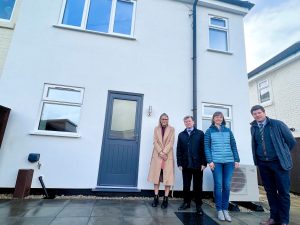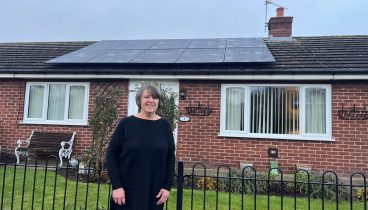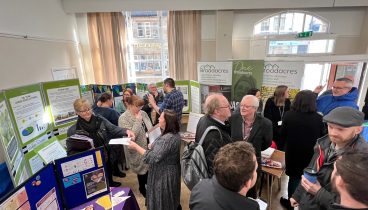 Broadacres is conducting an innovative project on four empty homes which is transforming them into the most energy efficient and environmentally friendly homes in its entire 6,600-plus stock.
Broadacres is conducting an innovative project on four empty homes which is transforming them into the most energy efficient and environmentally friendly homes in its entire 6,600-plus stock.
Broadacres has taken four representative homes and over the last 18 months has been undertaking work which will get them all to zero carbon ready standard.
This is a key part of the Association’s Sustainability Strategy which will ultimately result in it realising its ambition of being an entirely net zero carbon organisation by 2050. Broadacres adopted net zero due to the impact climate change will have on its homes, and to reduce the amount of energy residents need to run their home.
The first of the homes, in The Crescent, Northallerton, was handed over to a local resident in December, with the others – Vicars Croft, Northallerton; Allen Grove, Stokesley; and Broadacre (name of home) in Myton-on-Swale – ready to be occupied by spring. The home at The Crescent was recently given an energy efficiency rating (known as a SAP score) of A, which is the highest of any home Broadacres owns.
At an open day at Vicars Croft in February Broadacres unveiled one of the homes to interested parties, including residents and other housing associations.
The ‘deep retrofitting’ of these homes will reduce energy demand by up to 70% and will eventually reduce carbon emissions by 100% when the National Grid becomes decarbonized.
The work has included:
- Installing renewable energy, air source heat pumps
- Installing solar panels on the roofs
- Installing triple glazed windows and doors
- Laying thicker loft and floor insulation
- Using thicker external and internal wall insulation
- Adding high levels of air tightness to the buildings
- Installing a wastewater heat recovery system which uses residual heat from shower water to preheat the incoming cold feed that refills the system.
- Installing a mechanical ventilation heat recovery system which extract warm, damp air from the home and draw in fresh air from the outside. Heat from the extracted air is transferred to the incoming air.
As part of the project, Broadacres will be using smart monitoring equipment to allow for remote monitoring of internal temperature, humidity, air quality and electricity consumptions, as well as the heating, ventilation, and solar panel systems.
The Association is also drawing up a ‘lessons learned’ action plan to identify what improvements can be made to the process and how this work can ultimately be undertaken at all its homes, ahead of the 2050 deadline set by the Government for the UK to reach net zero carbon emissions.
Broadacres’ Chief Executive Gail Teasdale said: “We’re committed to providing customers with homes that are warm and affordable to live in. We’re obviously not going to be able to do such deep retrofitting work on homes where our residents are living, which is why we chose to undertake the pilot in empty homes, but even at this early stage we have already learned some good lessons which will inform our approach to maintaining and improving our existing homes.
“So, for example, we are already upgrading the specifications for our planned investment programme starting in April 2023 and are investigating whether it is feasible to deliver triple glazing to our homes.
“And there will be other opportunities where we are conducting regular maintenance work which will allow us to carry out more improvements to homes and which will be delivered around residents, with disruption kept to a minimum and our customers being fully involved in the planning for the work.
“It’s still early stages and this exciting pilot project will inform much of our future planning, but we are committed to achieving net zero carbon status by 2050, ensuring customers living in our homes benefit from energy efficient, environmentally friendly homes which are future-proofed and affordable to run.”




Share on:
Share Tweet